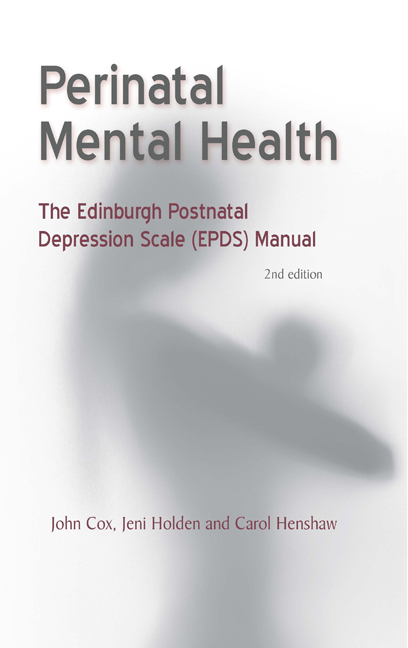Book contents
- Frontmatter
- Contents
- The authors
- Acknowledgments
- Abbreviations
- List of figures
- Foreword
- Preface to the first edition
- Preface to the second edition
- 1 Postnatal depression: an overview
- 2 The origins and development of the Edinburgh Postnatal Depression Scale
- 3 International and cross-cultural issues
- 4 Using the Edinburgh Postnatal Depression Scale in clinical settings: research evidence
- 5 Humanistic and person-centred interventions in perinatal depression
- 6 Screening and intervention services in the community
- 7 Using the Edinburgh Postnatal Depression Scale
- Appendix 1 The Edinburgh Postnatal Depression Scale
- Appendix 2 Translations of the Edinburgh Postnatal Depression Scale
- References
- Index
- Frontmatter
- Contents
- The authors
- Acknowledgments
- Abbreviations
- List of figures
- Foreword
- Preface to the first edition
- Preface to the second edition
- 1 Postnatal depression: an overview
- 2 The origins and development of the Edinburgh Postnatal Depression Scale
- 3 International and cross-cultural issues
- 4 Using the Edinburgh Postnatal Depression Scale in clinical settings: research evidence
- 5 Humanistic and person-centred interventions in perinatal depression
- 6 Screening and intervention services in the community
- 7 Using the Edinburgh Postnatal Depression Scale
- Appendix 1 The Edinburgh Postnatal Depression Scale
- Appendix 2 Translations of the Edinburgh Postnatal Depression Scale
- References
- Index
Summary
When establishing a perinatal mental health service it is always necessary to consider the local sociocultural context of childbirth and for health professionals to be culturally competent. In this way the likelihood that the EPDS is used inappropriately in different cultures and languages is diminished.
Translations
The EPDS has been translated into 57 languages and used in clinical work and research in all regions of the world. Appendix 2 contains many of these translations. This proliferation suggests that the identification of perinatal mothers with mental health problems has become a more significant public health priority.
The EPDS facilitates international and cross-cultural research as a first-stage screening questionnaire in prevalence studies and assists primary care workers to monitor the effectiveness of screening programmes and record outcomes in intervention trials. There are, however, important caveats to consider when using any translation of a questionnaire outside the culture and language in which it was developed. The EPDS, for example, is not a checklist of common depressive symptoms, and cross-cultural comparisons of EPDS scores can be misleading.
When planning to use the EPDS in a cross-cultural study therefore, it is helpful to consider both the ‘etic’ (when the culture is studied from an outside perspective) and the humanistic ‘emic’ approach, derived from an inside perspective of the local language and cultural attitudes. As suggested by Laungani (2000), different assumptions and techniques are often required to understand fully depressive disorders in unfamiliar cultures and this is of particular importance for perinatal mental disorders which are embedded in cultural customs, values and beliefs. Kumar (1994) has summarised this key point:
‘The way in which the impact (of childbirth) is felt by the individual parent must, to some extent, be shaped by the ways in which that parent's society and culture organises its response to parenthood, as well as by the structure of the family into which the child is born.’ (p. 250)
Thus in studies of postnatal depression in Uganda and Scotland (Cox, 1999) the need to understand local ‘folk’ causes of depression as well as the range of available traditional treatments and the explanation for the choice of presenting symptoms was immediately apparent to the research team. For example, Ugandan women were more likely to describe somatic symptoms and less likely to express feelings of personal responsibility for the development and nurture of the baby.
- Type
- Chapter
- Information
- Perinatal Mental HealthThe EPDS Manual, pp. 27 - 32Publisher: Royal College of PsychiatristsPrint publication year: 2014



